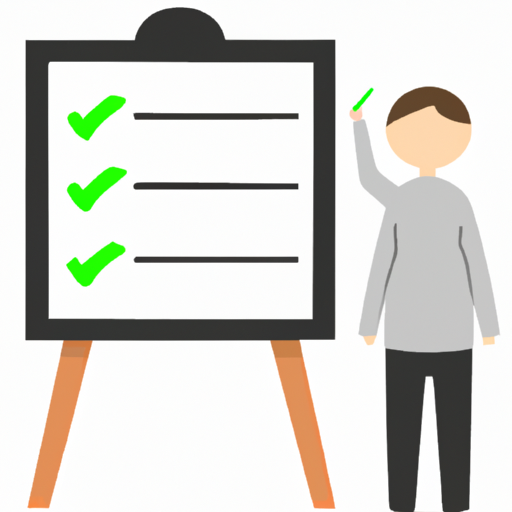What is an Informational Interview?
An informational interview is a conversation between a job seeker and a professional in a chosen field. It’s an opportunity to learn more about the industry, the company, and the job. An informational interview is not a job interview, it’s more of a networking opportunity. It is an invaluable tool for job seekers as it allows them to gain valuable insights into their field of interest, as well as build meaningful connections with people in their industry.
Informational interviews provide job seekers with a greater understanding of the job market and the specific skills and qualifications that employers are looking for. It is important to research the company and the person you are interviewing to get the most out of your conversation. During the interview, job seekers can ask questions about the industry, the company, and the job. An informational interview can also help job seekers decide if the company and job are the right fit for them.
Informational interviews can also open up the door to unexpected job opportunities. By talking to professionals in the field, job seekers can get the inside scoop about job openings and gain a competitive edge in the job search. Additionally, the interviewee may be able to provide referrals and helpful contacts. It is important to be sure to thank the person for their time and advice, as well as ask for a business card or contact information.
Informational interviews are also a great way to practice your interviewing skills. Job seekers can practice their communication, research, and networking skills. It is also an opportunity to practice your elevator pitch and to get feedback from a professional.
Informational interviews are an invaluable job search tool. They provide job seekers with the opportunity to gain valuable insights into their field of interest, as well as build meaningful connections with people in their industry. It is also a great way to practice your interviewing skills and to open up the door to unexpected job opportunities. By taking the time to research the company and the person you are interviewing, and to thank them afterwards, job seekers can get the most out of their informational interview.

Identifying and Reaching Out to Potential Interviewers
Informational interviews are an invaluable tool for job seekers, which can help them learn about a company, gain insights into a potential career, and build connections with industry professionals. Identifying and reaching out to potential interviewers can be a daunting task, but it doesn’t have to be. With a little planning and creativity, job seekers can make the most of their informational interviews and get the information they need to make an informed decision about their career.
The first step in identifying potential interviewers is to identify your goals. What type of information are you looking for? What kind of career are you interested in? Once you have identified your goals, you can begin to research potential interviewers. Look at your current network, as well as professional associations, websites, and other sources of information to find potential interviewers who will be able to provide you with the information you need.
Once you have identified potential interviewers, it’s time to reach out. Start by sending a personalized email introducing yourself and explaining why you are interested in the position. Be sure to include your resume or a link to your LinkedIn profile. If you are unable to contact someone directly, you can also reach out to their assistant or Human Resources department.
When reaching out to potential interviewers, it’s important to be professional yet friendly. Keep your message brief and to the point, but be sure to include a few personal details about yourself that relate to your goals. This can help establish a connection and make the interviewer more likely to respond positively.
Finally, be sure to follow up after your informational interview. Thank the interviewer for their time and let them know that you are interested in pursuing the opportunity. This is a great way to show your commitment and demonstrate your enthusiasm.
Informational interviews can be a great way to learn more about a potential career and make connections with industry professionals. By identifying and reaching out to potential interviewers and following up after the interview, job seekers can make the most of their informational interviews and get the information they need to make an informed decision about their career.

The Benefits of Informational Interviews
In today’s competitive job market, informational interviews can be a powerful tool for job seekers. An informational interview is a type of networking where you can connect with people who are already doing the type of job you are interested in pursuing. It allows you to learn more about the job and the industry, as well as gain insight into potential career paths.
Informational interviews can give you a leg up when it comes to researching and preparing for a job. Through an informational interview, you can learn about different roles, challenges, and opportunities available in the field. You can find out what kind of qualifications and experience are necessary to be successful in the job. You can also ask questions about the job environment and culture, and find out what the hiring process is like.
Informational interviews can also help you make important connections and network with professionals in the field. You may be able to gain insight into the job market and make contact with potential employers. This can help you get your foot in the door and increase your chances of getting an interview.
Informational interviews can also help you build confidence in yourself and your ability to do the job. By talking to people in the field, you will gain a better understanding of your skills and what you need to do to be successful. You will also learn about the day-to-day tasks and responsibilities associated with the job.
Informational interviews can also help you identify and pursue other career paths. By talking to people who have already achieved success in their chosen field, you will be able to gain valuable insights into the different career paths available to you. This can help you narrow down your options and focus on the path that is right for you.
In addition, informational interviews can be a great way to practice your interviewing skills. This will help you prepare for future job interviews, by allowing you to get comfortable with the interview process and gain experience with answering questions.
Informational interviews are an invaluable resource for job seekers. They offer a unique opportunity to gain insight into the industry, make important connections, and practice your interviewing skills. By taking advantage of these benefits, you will be able to increase your chances of success when looking for a job.

Making the Most of an Informational Interview
When it comes to job search strategies, informational interviews can be a powerful tool for job seekers. An informational interview is a conversation between a job seeker and someone who is knowledgeable about a particular career field or company. It is an opportunity for job seekers to gather information, gain insight and make connections.
Informational interviews can be incredibly valuable for job seekers. They can provide an opportunity to learn more about a particular career field or company, get advice from someone who is experienced in the industry, and make valuable connections that can help lead to job openings.
Informational interviews are not always easy to come by, but there are several ways to make the most of them. For starters, it’s important to have a clear goal in mind when you go into an informational interview. Knowing what you want to get out of the conversation will help you stay focused during the meeting and make sure you get the most out of it.
It’s also important to do your research ahead of time. This can include researching the person you’re interviewing and the company or industry they work in. Knowing as much as possible about the subject matter can help you have an informed and meaningful conversation.
When you meet with the person for the informational interview, be sure to prepare and ask meaningful questions. Ask open-ended questions that will allow the person to share their insights, experiences, and advice. You should also be prepared to answer questions about yourself and your interests.
At the end of the informational interview, don’t forget to thank the person for their time and advice. Ask them if they would be willing to keep in touch and offer to provide updates on your job search.
Informational interviews can be invaluable resources for job seekers. By preparing ahead of time, asking meaningful questions, and following up after the meeting, job seekers can make the most of their informational interviews. They can provide valuable insight into their chosen career field and make connections that can help them find the job of their dreams.

Preparing for an Informational Interview
An informational interview is an invaluable tool for job seekers looking to get ahead in their career. It allows you to gain a better understanding of what a potential employer is looking for and to make connections within the industry. Preparing for an informational interview requires a little bit of research and planning, but the rewards can be immense.
Start by researching the company and the individual you are meeting with. This will give you an idea of the company’s culture and the type of person they are looking for. Make sure to look up the individual’s background and interests, as this will give you an opportunity to make a connection during the interview.
Once you have done your research, make a list of questions that you want to ask to ensure you get the most out of the informational interview. Try to focus on questions that will give you insight into the company’s culture and the individual’s experience in the industry. It’s often helpful to ask open-ended questions such as “What do you like most about working here?” or “What advice would you give to someone just starting out in this field?”
Additionally, be sure to bring a copy of your resume and any other documents that might be relevant to the conversation. Preparing a portfolio of your work is also a great way to show off your skills and give the interviewer an idea of what you can bring to the table.
The best way to prepare for an informational interview is to practice. Talk to friends and family to get a better idea of how to present yourself and to practice answering questions. This will help you feel more confident and prepared when it comes time for the real interview.
Finally, remember to be yourself. Don’t be afraid to show your personality and to be honest about your experience. You don’t have to be perfect, but an informational interview is a great opportunity to show off your unique skills and qualities.
Informational interviews can be a great way to gain insight into the industry and to make connections with potential employers. By doing a little bit of research and preparation, you can make the most of the opportunity and get one step closer to your dream job.

Creating a Lasting Impression
Creating a lasting impression during a job interview is the goal of every job seeker. An informational interview is an effective way to do just that. An informational interview is a type of job interview where the goal is to network, gain valuable insights about a particular job or industry, and build relationships with potential employers.
Through an informational interview, job seekers can make an impression that will last long after the meeting is over. When done correctly, the informational interview can be a powerful tool for job seekers to stand out from other applicants. Here’s how.
First, job seekers should prepare well ahead of the interview. Research the person you are interviewing and their company, industry, and job. This research will help you develop thoughtful questions to ask during the interview. It will also show the interviewer that you have taken the time to learn more about the industry.
Second, job seekers should make sure to dress in professional attire. This will not only show the interviewer your commitment to the process but also demonstrate that you are serious about the job.
Third, be sure to be organized and arrive on time. Being on time shows the interviewer that you value their time, and that you are respectful and reliable.
Fourth, be sure to listen carefully to the interviewer’s answers. Take notes and follow up with any questions you may have. This will demonstrate that you are engaged in the conversation and interested in the information being presented.
Fifth, be sure to express your enthusiasm for the job. Showing passion for the opportunity is a great way to make a lasting impression.
Lastly, be sure to follow up with a thank-you note after the interview. This will not only remind the interviewer of who you are, but also demonstrate that you value their time and the insight they provided.
By taking the time to prepare for the informational interview and following these tips, job seekers can create a lasting impression and stand out from other job seekers. An informational interview can be a powerful tool for job seekers, and by following these tips, job seekers can make sure they are successful.

Informational Interviews for Career Development
Informational interviews are a great way for job seekers to gain valuable insight into their career paths and to learn more about potential job opportunities. They are a great way to network, build relationships and stay informed about the industry.
Informational interviews are more than just a conversation about job openings. They can provide an inside look into what it is like to work at a particular company, the types of skills and qualifications are needed for the job, and the company culture. This can be invaluable information for job seekers who want to make sure they are a good fit for the job.
Informational interviews can also provide job seekers with an opportunity to learn more about the industry, the current trends and the competition. With this information, job seekers can better prepare their resumes and portfolios, as well as be more competitive in their job search.
Informational interviews also give job seekers the chance to ask questions and gain insight from professionals who are already working in the industry. This can give job seekers access to valuable advice and tips on how to succeed in their career.
Informational interviews are also a great way to build relationships and network. By talking to professionals in the industry, job seekers can create a network of contacts that can help them find job opportunities.
In addition, informational interviews give job seekers a chance to showcase their skills and qualifications. By demonstrating their knowledge and passion for the industry, job seekers can make a strong impression on potential employers.
Informational interviews are an invaluable tool for job seekers to gain insight into their industry, build relationships and showcase their skills. They are a great way to stay informed and gain access to valuable advice and tips. By taking the time to research and prepare for informational interviews, job seekers can increase their chances of success in their job search.

Informational Interviews vs. Job Interviews
Informational interviews are an invaluable tool for job seekers, and understanding the differences between them and a traditional job interview can help you maximize your chances of success. An informational interview is a conversation with someone in your field of interest, in which you ask questions to gain more insight into the industry and its requirements. This is different from a job interview, in which you attempt to convince the employer that you are the best fit for a particular vacancy.
Although informational interviews are not intended to lead directly to a job, they can be beneficial to job seekers in several ways. For starters, they help you gain an understanding of the industry and the specific roles, skills and qualifications that employers look for. This knowledge can help you decide on the best career path for you and ensure that you are well-prepared when it comes to applying for available jobs.
Informational interviews also provide job seekers with an opportunity to network and make connections within their chosen field. This is beneficial, since it can help to increase your chances of getting noticed by potential employers. Additionally, through informational interviews, you can get an insider’s perspective on what employers are looking for in candidates and how to stand out from the competition.
Informational interviews also provide job seekers with the chance to practice their interview skills. This is an excellent opportunity to develop your interpersonal and communication skills, as well as hone your ability to answer questions in a professional manner. Additionally, it can help you become more familiar with the types of questions employers typically ask, allowing you to better prepare for job interviews.
Finally, informational interviews can be an effective way to establish a rapport with potential employers. By getting to know someone in the industry and building a relationship with them, you can increase your chances of being remembered when an appropriate job vacancy arises.
In summary, informational interviews are an invaluable tool for job seekers, as they can provide valuable insight into the industry, help create connections, and offer an opportunity to practice interview skills and build relationships with potential employers. Therefore, it is important to understand the differences between informational interviews and job interviews, so that you can make the most of them.

How to Follow Up After an Informational Interview
After an informational interview, it is very important to follow up in order to make a lasting impression and to ensure that you are top of mind with the interviewer. Following up is a great way to express your gratitude for the opportunity and to show that you are serious about the job search process.
There are several ways to follow up after an informational interview. The first is to send a thank you note or email. A thank you note can be a great way to express your gratitude for the interviewer’s time, and it also offers an opportunity to recap the conversation and to offer additional information that may have been missed. It is important to not only thank the interviewer, but also to reiterate why you are the perfect candidate for the job.
Another way to follow up after an informational interview is to reach out with an update. This allows you to keep in touch with the interviewer and to provide any new information that may be relevant to the job opening. It is also a great way to share any success stories or new contacts that you have made since your initial conversation.
You can also stay in touch with the interviewer by connecting with them on social media. This is a great way to stay connected with the interviewer and to show that you are keeping up to date with their work and career. This can also be a great way to start a conversation and to share any new information that may be relevant to the job.
In addition to staying in touch with the interviewer, it is also important to keep the lines of communication open between you and the company. This can be done by attending any events that the company is hosting or by reaching out with any questions that you may have. This is a great way to show the company that you are serious about the job search and that you are interested in learning more.
Finally, be sure to follow up with any questions or requests that the interviewer may have asked you to do. This is a great way to demonstrate your commitment to the job search and to show that you are taking the process seriously. Following up is a great way to show that you are organized, motivated, and eager to make a good impression with the interviewer.
By following up after an informational interview, you can make a lasting impression and ensure that you are top of mind with the interviewer. Following up is a great way to express your gratitude and to show that you are serious about the job search process. Whether it is through sending a thank you note, connecting on social media, or staying in touch with the company, following up is an important step in the job search process.





